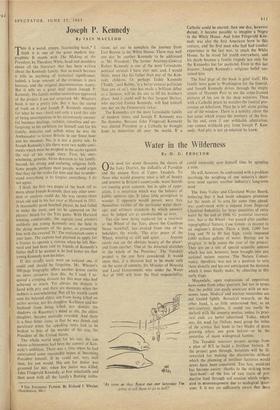Water in the Wilderness
By H. G. PROCTOR
OUR need for water threatens the shores of the Lake District, the daffodils of Farndale and the unique flora of Upper Teesdale. To those who would preserve what is left of beauty and interest in Britain's countryside, water boards are causing great concern; but in spite of oppo- sition, it is uncertain which way the balance of public' opinion tips. It takes little perception to wonder if opposers would persist, were they themselves victims of the particular water short- age; and ultimate standards by which amenity may be judged are as unobtainable as ever.
The site now being explored for a reservoir at the Wheel of the Tees, above the Cauldron Snout waterfall, has evoked from one of its beholders the words, 'The utter peace of the Wheel, winding so still and quiet. . . . Anyone surely can see the obvious beauty of the place'; and from another, 'One of the dreariest stretches in the whole of the Pennines.' The Teesdale project is the one here considered. It would seem that, if a decision had to be made only on the score of amenity, the Minister of Housing and Local Government, who under the Water Act of 1945 will have the final responsibility,
'As soon as they figure out our language I'm going to tell them to go to hell!'
could excusably save himself time by spinning a coin.
He will, however, be confronted with a problem involving the weighing of one industry's short- term need against another industry's long-term need.
The Tees Valley and Cleveland Water Board, believing that it had made adequate provision for the needs of its area for some time ahead, was confronted with a request from Imperial Chemical Industries for large quantities of extra water by the end of 1966. 0i• potential reservoir sites, that at the Wheel —but named after another topographical feature, Cow Green—is nearest to an engineer's dream. There a dam, 2,000 feet long and 70 to 80 feet high, could impound 8,000 million gallons of water. Borings are in progress to help assess the cost of the project. They are on a site of special scientific interest which has not, however, been brought into any national nature reserve. The Nature Conser- vancy, therefore, was not in a position to veto them directly and has not anticipated the decision which it must finally make, by objecting at this early stage.
Meanwhile, open expressions of opposition have come from other quarters, but not in terms that the public can easily associate with an eco- nomic issue. Medical and nuclear researches are not treated lightly. Botanical research, on the other hand, is so little understood that, as an anti-reservoir motive, it could too easily be shelved with the amenity motive, unless its prac- tical ends are better advertised. Today, which sees the need for Oxfam, must grasp the value of the science that leads to two blades of grass growing where one grew before--or be the yesterday of more widespread famine.
The Teesdale reservoir project springs from a plan of ICI to build a fertiliser factory. If the project goes through. botanists will be ill- rewarded for making the discoveries without which the planning of fertiliser factories would never have been conceived. Too late, mankind has become aware—thanks to the striking term `dust-bowl'—of the loss 'of vast tracts of pro- ductive land through soil erosion which origin- ated in mismanagement due to ecological ignor- ance. It is not yet sufficiently aware that there
has been a compensating improvement in the yield of useful crops due to the introduction of new varieties, which would not have been possible without the basic knowledge supplied by botanists. Also not in the top twenty items of popular interest is the dependence of agricul- ture upon botanical research in its fight against the bacterial and fungoid enemies of plants.
Recollection of particular applications of botany is, however, needed less than suppression of mistrust in 'pure' science. Suppliers of water can hardly disparage it, in view of the unex- pected possibilities of monomolecular films for minimising evaporation from reservoirs in hot climates. It is doubtful if Gregor Mendel foresaw how beneficial his investigations into the heredity of peas would become. Sir John Russell has written, 'As pure science advances it shows ways by which the extent and productivity of the cul-
tivated land can be increased.' • A long-term need of the agricultural industry is for more and more knowledge, which will lead to increased productivity and immunity to disease in plants that provide us with food. Along the road to any worthwhile discovery is some vital clue without which the discovery would not be made. That Upper Teesdale is of 'unique' scientific value means that it is believed that in it are vital clues unlikely to be awaiting notice elsewhere. When those who seek such clues, for mankind's benefit, speak of 'an irreplaceable open-air laboratory,' and say that keeping the area intact 'must rank as the most urgent con- servation issue in Britain at the present time,' they should be heeded.
Zoology, too, bears on food production. An assistant professor of the biological sciences at an American university, in a letter to the present writer, has said, 'I cannot think of a more unhappy choice for a reservoir site in the whole of England, from the standpoint of zoological and botanical significance. I am sure that all American botanists who are at all familiar with the area will be just as upset at the prospect as 1 am.' Not only British, but scientists of other nations look to Upper Teesdale to provide them with phenomena that cannot be found elsewhere.
If a reservoir is made at Cow Green, its effect will extend beyond ground directly flooded. Those who are not ecologists enough to under- stand why must take it on trust that an altera- tion in the ground water-table over a wide neighbouring area is likely to be disastrous. Interference with delicately balanced climatic fac- tors is also foreseen.
Sites for reservoirs to supply Tees-side's need for water are available outside the area of scien- tific value. They could not be brought into use so quickly and may cost more. The alleged need for haste should be closely investigated. Extra cost would be heavily outweighed by any dis- covery that led a widely grown food plant to yield a bushel more per acre over the years that we hope lie ahead for mankind. It might not be just, however, to leave that extra cost to be born wholly by the water board concerned.
The issues behind the Teesdale reservoir cdn- troversy are wider than those behind the con- troversies over other water schemes. They include an economic one, which an attempt has here been made to state, between a short-term need of the Tees-side chemical industry for water in a hurry and a long-term need of the agricultural industry that there shall be no hampering of the scientists who can help to make a con- tinuance of Oxfam unnecessary.







































 Previous page
Previous page